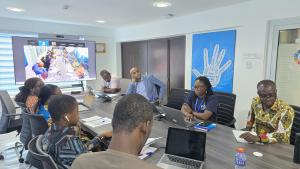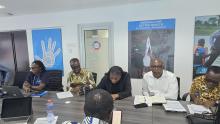Ghana Advances School Health Reform with Orientation on WHO Global Standards
Ghana is making significant progress toward strengthening its school health system through the ongoing revision of its national School Health Policy. Supported by the World Health Organization (WHO) and funded by Fondation Botnar, this initiative seeks to alignthe draft policy with the WHO-UNESCO Global Standards for Health-Promoting Schools (HPS). These standards provide a comprehensive framework for creating safe, inclusive, and supportive school environments that foster both physical and mental well-being, while enhancing academic achievement.
To support this alignment process, a two-day orientation was held from 25th to 26th June 2025 to build the capacity of members of the multi-sectoral Technical Working Group (TWG) leading the policy development. While the sessions was facilitated virtually by WHO Headquarters, national stakeholders convened in person at the WHO Country Office in Accra, allowing for dynamic engagement and collaborative discussion.
The orientation aimed to deepen understanding of the Global Standards, provide practical implementation guidance, and initiate national-level planning to integrate the standards into Ghana’s draft policy.
Welcoming participants on behalf of the WHO Country Representative, Dr. Asrat Sofonias, Health Systems Advisor and ULC Cluster Lead, emphasized the importance of the orientation as a pivotal step toward ensuring every school in Ghana becomes a setting that promotes health and well-being.
“Your technical insights, experience, and collaboration are what will transform this policy from a document into action that touches the lives of children and adolescents across the country”, he stated.
Mr. Dzomeku Selasi, Deputy Director in charge of School Health at the Ministry of Education, highlighted the collaborative effort behind the policy’s development. “The team has gone through several processes with multiple stakeholders to arrive at the current draft,” he noted.
Dr. Valentina Baltag, Unit Head for Adolescent and Young Adult Health at WHO Headquarters, introduced participants to the WHO-UNESCO Global Standards, explaining the rationale for adopting a whole-school approach and detailing steps for implementation, including monitoring and evaluation frameworks.
The second day focused on practical planning. TWG members worked together to identify areas within the draft policy that require realignment with the Global Standards. Discussions also centered on the technical assistance required for the next phase of policy development. These collaborative sessions fostered a shared understanding of the whole-school approach and reinforced the critical need for strong stakeholder engagement and intersectoral coordination to deliver equitable and sustainable school health services.
The orientation concluded with clear next steps, including finalizing revisions to the draft policy, validating the updated version through the TWG, mobilizing additional technical support, and developing a national implementation roadmap. This roadmap will guide the rollout of health-promoting schools across Ghana and advance the country’s commitment to child and adolescent health and well-being.
For Additional Information or to Request Interviews, Please contact:
Abdul-Lahie Abdul-Rahim Naa
Communications Officer
WHO Ghana Country Office
Email: abdullahiea [at] who.int (abdullahiea[at]who[dot]int)
Tel: +233 20 196 2393

